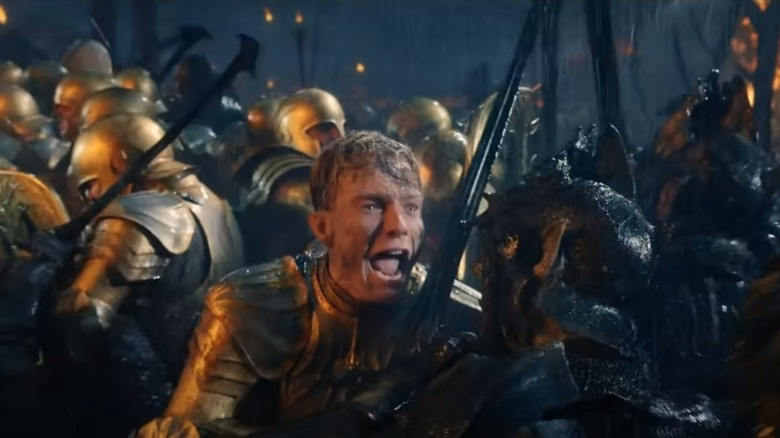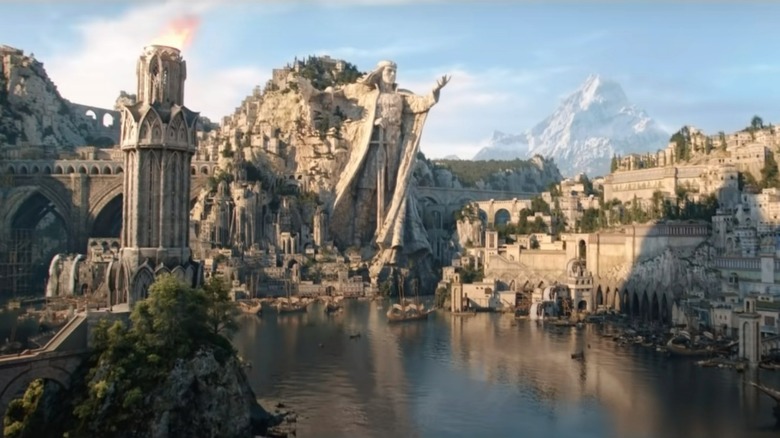The Lord Of The Rings: The Rings Of Power Showrunners Explain What They Can And Can't Adapt
Man, remember the days when being a fan of a famous property didn't require an extensive knowledge of corporate acquisitions and the complicated ins and outs involved with ownership of rights to original properties?
Before Amazon first purchased the rights to create the series that would eventually become "The Lord of the Rings: The Rings of Power," an army of lawyers likely descended upon the agreement to parse out exactly what material can and can't be used in the upcoming series. Because of the Tolkien Estate's incredibly protective stewardship of the late author J.R.R. Tolkien's various novels, notes, letters, and other works, any adaptation would be required to set highly specific boundaries for stories set in Middle-earth.
"The Lord of the Rings" and "The Hobbit" easily come to mind as Tolkien's most famous works, but he also wrote additional material in the form of backstory-filling appendices located at the end of "The Return of the King," the historical epic "The Silmarillion" (written in prose that resembles classic poetry rather than a traditional narrative), various novels expanding on that history like "The Children of Hurin" and "The Fall of Gondolin," and more that were completed, edited, and posthumously published by Tolkien's son, Christopher. Though invested fans would likely give anything to see adaptations of all of those stories, the reality of the situation dictates otherwise. For Amazon's purposes, only a small slice of this material remains available to them, according to series co-creators and co-showrunners Patrick McKay and J.D. Payne.
In an interview with Vanity Fair, the two spilled the details on exactly what limits they had to work around in creating this new series, set thousands of years before the events of "The Lord of the Rings." As Payne tells it:
"We have the rights solely to 'The Fellowship of the Ring,' 'The Two Towers,' 'The Return of the King,' the appendices, and 'The Hobbit.'" And that is it. We do not have the rights to 'The Silmarillion,' 'Unfinished Tales,' 'The History of Middle-earth,' or any of those other books."
So what does that all mean for the actual events that will be covered in Amazon's "The Rings of Power" series? I'm glad you asked!
Reading between the lines
"The Rings of Power" is mainly set during the Second Age of Middle-earth, a sort of in-between period of history after the Dark Lord Morgoth (Sauron's much more powerful boss, essentially) was defeated but long before the events of "The Lord of the Rings" (which mostly occurred in the Third Age). Back when none of us had any real idea when the then-untitled "The Rings of Power" would actually take place — if you remember, the marketing team seemed content for the longest time to tweet out vague maps of Middle-earth that only the biggest nerds would understand — many fans assumed we'd get new adventures set during the First Age, possibly the most thrilling time in all of Tolkien's fictional history. That would mean adapting "The Silmarillion" and other related works, but we now know definitively that won't be the case. Instead, we may only get the briefest glimpses of the First Age while the rest of the series deals with the events of the Second ... but there's only one big problem. Tolkien never actually wrote any books or in-depth material about those events.
So how to solve this little conundrum? The creators and writers of "The Rings of Power" had to get creative. McKay goes on to explain:
"There's a version of everything we need for the Second Age in the books we have the rights to. As long as we're painting within those lines and not egregiously contradicting something we don't have the rights to, there's a lot of leeway and room to dramatize and tell some of the best stories that [Tolkien] ever came up with."
Luckily, Tolkien exposited some of that period of history through firsthand or secondhand accounts from other characters throughout "The Lord of the Rings." Payne and McKay cite heavy info-dump chapters from "The Fellowship of the Ring," like the "Concerning Hobbits" prologue or "The Council of Elrond," both of which contain plentiful details about ancient history (to characters like Frodo, at least) going back to the events that "The Rings of Power" will deal with. As constraining as that may seem, this actually gave the writing team even more leeway to fill in the blank spaces left by Tolkien. I'm cautiously optimistic to see how it all turns out!
"The Rings of Power" debuts on Amazon Prime Video on September 2, 2022.

